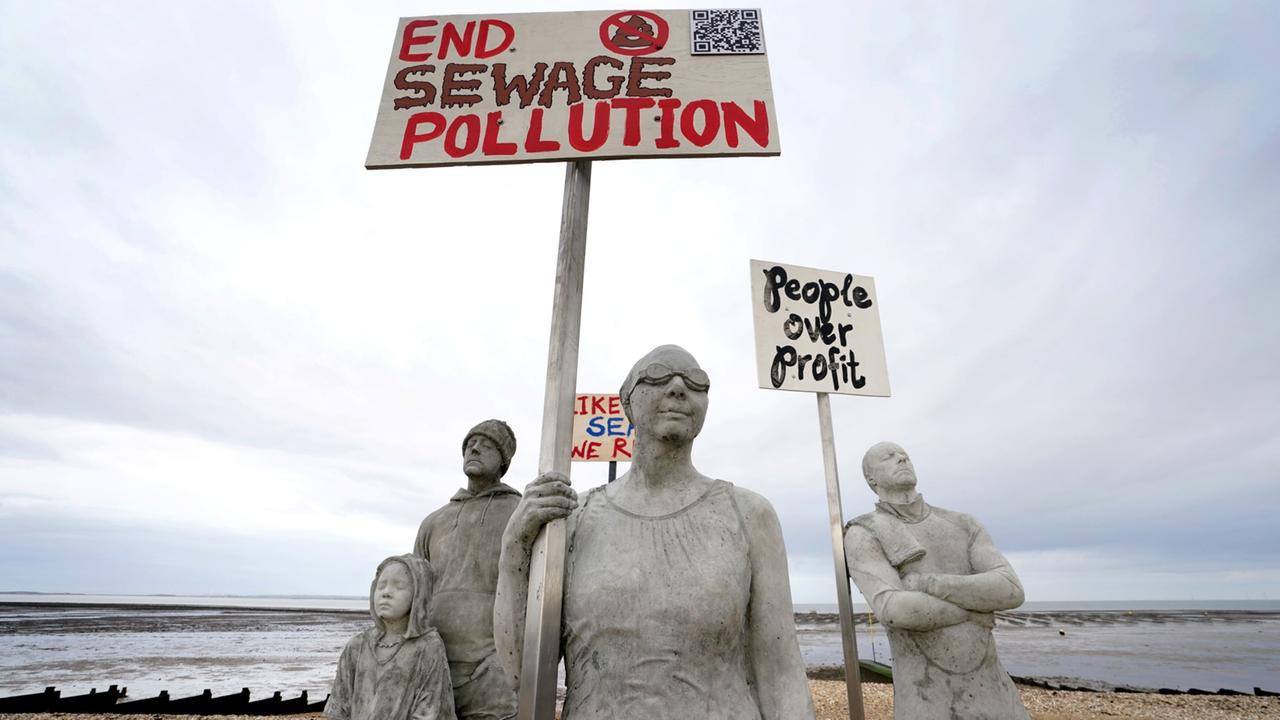world mirror
In England, millions of cubic meters of untreated water are dumped into rivers and the sea. Now there is resistance: In many places, residents are refusing to pay their water bills.
Whitstable is actually an idyllic seaside and harbor town – just an hour and a half east of London – with a wonderfully wide beach. The whole thing has only one flaw, which you can't see: it stinks. Whenever it rains heavily, the water companies discharge unfiltered feces into the harbor and thus into the sea.
This is a huge problem for fishermen like Graham West, who grow and sell the famous Whitstable oysters here, he explains to everyone who passes his shop.
“It's an incredible mess, it happens every time it rains. We're fishermen, we need clean sea water for our oysters when we get them out there.”
Fresh oysters have to be cleaned extensively
He can no longer sell his oysters directly, he now has to clean them for at least 72 hours; an upstream filter disinfects the sea water so that the fecal residue is flushed out of the oysters.
A huge effort: “It costs me significantly more money, electricity, more time and I can process a lot fewer oysters here overall. I used to sell 40,000 here in a week.” Today there are a maximum of 5,000 per week. He says he can't survive like this in the long term.
The situation on the beach is even more dramatic. Wherever small, red and at first glance innocent cones protrude from the water, sewer pipes are hidden from which the water companies, which were privatized years ago, are legally allowed to discharge excrement into the sea when the sewage system is overloaded.
Protests against the practice of Water company
Ed and Catherine are members of a local initiative that wants to change that. They inspect the pipes regularly because the permit is actually only valid for rare, exceptional situations, they say.
“If it has rained heavily, then the dirt can be discharged because otherwise the wastewater will back up into the houses. But this permit was only for extreme weather, maybe eight times a year, but now we have it every two weeks, at least.”
But even in normal weather and sunshine, a disgusting smelling brown broth usually comes out of the pipe. The really big messes, they explain, always happen at high tide so that they go as unnoticed as possible. In 2023 alone, such untreated wastewater was officially discharged into rivers and the sea 400,000 times.
And these are just the cases that have been registered. Since this is only legal to this extent in a few cases, the companies have to pay fines, but these are usually so small that they can easily handle them.
Dirty legacy of the Thatcher government
Since Margaret Thatcher privatized the English water companies in 1989, they have paid out the equivalent of more than 70 billion euros to their shareholders, but have only invested marginally in sewage pipes and infrastructure. Which is why English rivers and the sea are now sinking into muck.
More and more often, Brits who simply went swimming are ending up in hospital, often with severe liver poisoning, because there are lots of bacteria in untreated sewage.
Last summer there were unusually loud protests on many beaches, including Whitstable, and thousands gathered at the harbor to protest against chronic water pollution.
Margaret Thatcher radically changed Britain. The consequences of their policies can still be felt – and smelled – today.
Untreated wastewater is also dangerous for bathers
One of the demonstrators is Elaine Hefemann. She became so ill last year that she couldn't go to work for weeks. Since then, she has simply boycotted her water bill: “I've been paying since the water supply was privatized, the companies took it all over with no debt, we paid for years so that they could invest in the infrastructure and they just didn't do anything. Why should I Pay for it again now?”
The circle of active resisters is still a small one; a local artist has erected a concrete monument to them on the beach. Because once they get angry here, it lasts. The demand: The water companies must be nationalized again, says Elaine: “And without the shareholders getting any more money, they have received billions in the last few years! Why should anyone Make any money from our water? Soon they'll sell us the air we breathe if we let them.”
It will be decades before the British can swim in their sea without worries again. But even if the state were to take over the ailing system again, a large part of the costs that would arise if the infrastructure were then repaired would ultimately have to be borne by taxpayers.





